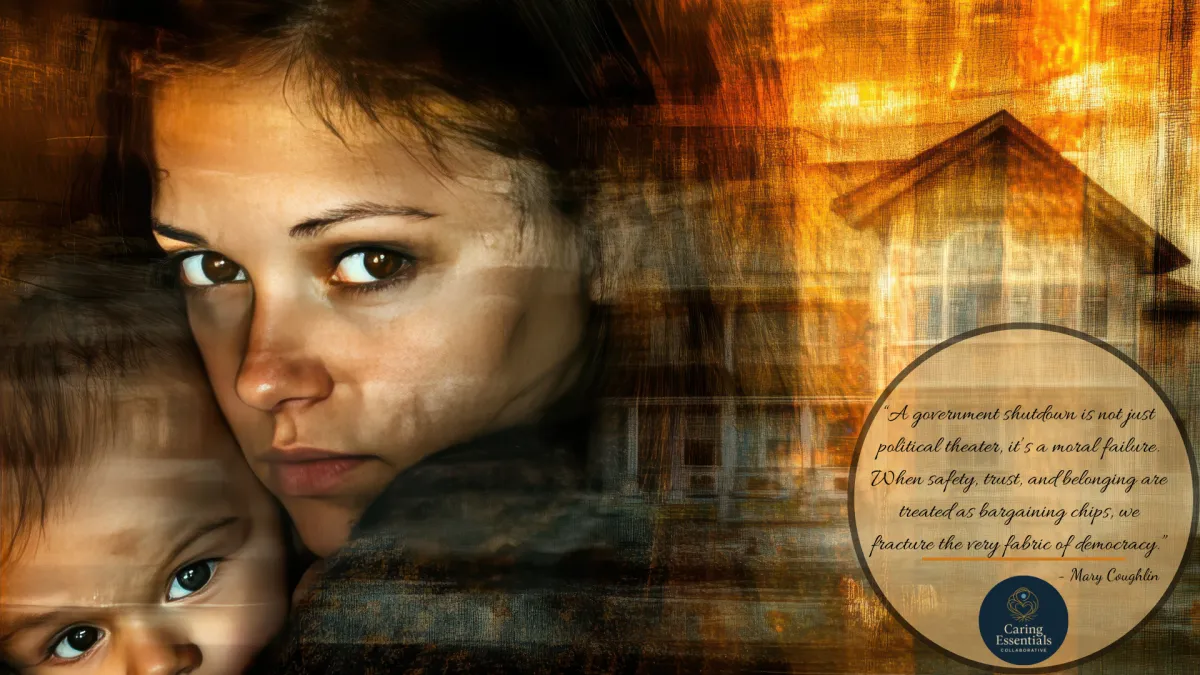
When the System Shuts Down: A Trauma-Informed Reckoning
“A government shutdown is not just political theater, it’s a moral failure. When safety, trust, and belonging are treated as bargaining chips, we fracture the very fabric of democracy.” - Mary Coughlin
When the System Shuts Down: A Trauma-Informed Reckoning
The Hidden Trauma of Shutdowns
When Congress cannot do its most basic job, funding the government, to keep essential services running, the fallout is not abstract. It is not “Washington dysfunction” or “political theater.” It is human. It is trauma.
A government shutdown is not just a pause in bureaucracy. It is a rupture in safety, trust, and belonging. And it is ordinary people, workers, parents, children, elders, the medically fragile, the food-insecure, who pay the price.
The Hidden Trauma of Shutdowns
Shutdowns are often measured in billions of dollars lost to the economy (Brookings Institution). But the real costs are harder to quantify: the mother who can’t access WIC benefits to feed her infant, the federal employee who must show up for work without knowing how she will cover rent, the child whose parent spirals into anxiety as bills pile up.
Trauma is not just about violence or disaster. Trauma is what happens inside us when the systems that are supposed to protect and sustain us break down.
Safety is shattered when paychecks vanish, programs stall, and families wonder if they can put food on the table.
Trust is betrayed when the government — the very institution meant to safeguard the common good — turns its back on the people it serves.
Equity is eroded when those already carrying the heaviest burdens — low-income families, communities of color, people with disabilities, immigrants — are left to bear disproportionate harm.
Shutdowns replicate the very conditions trauma thrives on: unpredictability, powerlessness, and abandonment.
Who Is Responsible?
Make no mistake: shutdowns are a choice. They are not acts of God or unavoidable natural disasters. They are manufactured crises born of political brinkmanship (PBS NewsHour).
Congress holds the purse strings. When lawmakers use funding as a weapon, to score points, enforce ideology, or stall progress, they are gambling with human lives. The President, too, plays a role, wielding veto power or negotiation leverage.
But the deeper truth is this: we the people have tolerated a system that allows leaders to hold our safety hostage. We have normalized the idea that political dysfunction is business as usual.
That normalization is its own kind of betrayal.
Trauma-Informed Accountability
A trauma-informed lens doesn’t just ask, “Who’s to blame?” It asks, “Who is harmed? How do we repair? How do we prevent this from happening again?”
Repair begins with honesty — leaders must name the harm, not minimize it (Center for American Progress).
Accountability means centering the vulnerable — children, elders, patients, workers living paycheck to paycheck. They must not be afterthoughts in budget negotiations.
Prevention requires systemic change — multi-year budgets, protected funding streams for critical programs, and governance structures that put people above politics
This Is About Us
Shutdowns fracture more than government services, they fracture trust in democracy itself. Each time our leaders play chicken with the basic functioning of government, the social contract weakens. Cynicism grows. Belonging erodes.
And that, too, is trauma. When people lose faith in the systems that bind us together, hopelessness sets in.
But here is the truth: we are not powerless.
Call to Action: Reclaim the Social Contract
We cannot allow shutdowns to be treated as political strategy. We must demand trauma-informed governance — leadership that understands the human consequences of its decisions.
Tell your story. If you are harmed by a shutdown, speak it. Write to your representatives, post on social media, talk to your community. Trauma hides in silence — visibility is power.
Hold leaders accountable. Contact your legislators via house.gov and senate.gov. Remind them: a shutdown is not neutral. It is violence by neglect.
Stand with the vulnerable. Donate to Feeding America’s food bank network or support furloughed workers through the Federal Employee Education & Assistance Fund. Community is our strongest buffer.
Push for reform. Advocate for automatic continuing resolutions that keep government open even when negotiations stall. Stability is not optional — it is the baseline of a functioning democracy.
A government shutdown is more than a fiscal standoff. It is a moral failure. It is a wound that cuts across households, communities, and the very fabric of democracy.
We are the ancestors of the future. What will they say we tolerated? That we shrugged at dysfunction? Or that we stood up and said: enough.
The time to reweave our social contract is now.
Safety. Trust. Belonging. These are not bargaining chips. They are birthrights.
Let it be said that we chose care.
Mary
